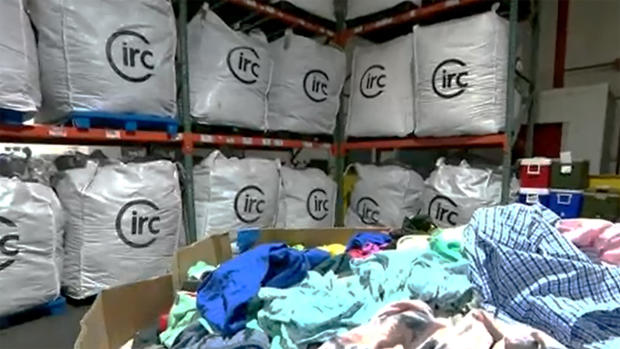What generally happens when clothes go out of style is giving the fashion industry a bad look. “The fashion and textile industry is one of the most wasteful industries in the world,” said Conor Hartman, chief operating officer of Circ, a climate tech startup trying to refashion the clothing industry. “The world is producing more than 100 million tons of textiles every 12 months. It’s equivalent in weight to a million Boeing 757s.”
According to the United Nations Environment Programme, the fashion industry is responsible for about 10% of annual planet-warming greenhouse gas emissions, mainly through manufacturing and transportation of clothing. That’s more than the emissions of all international air travel and maritime shipping combined. And The World Bank reports that, because of the growth of cheap, trendy clothing called “fast fashion,” those emissions are projected to increase by more than 50% by 2030.
Some used clothing is exported to foreign countries, where it’s piled up on the western shores of Africa, or dumped in the deserts of Chile. “Most of it is ending up in landfills or incineration,” said Hartman. “There’s a garbage truck of fashion waste that is dumped every second of every day.”
According to the Ellen MacArthur Foundation, the average piece of clothing in the U.S. is now worn just seven times, and worldwide less than 1% of textile waste gets recycled back into textiles.
That’s because most of our clothes are a blend of cotton and polyester (essentially plastic), making them nearly impossible to recycle. But at a pilot facility in Danville, Va. (once a bustling hub for textiles and tobacco), the Circ team cracked the code, inventing a way to separate the two through a chemical process.
Our process, for lack of a better term, is a pressure cooker,” said Hartman. “It’s a very fancy insta-pot.”The chemical reaction liquifies the polyester, while the cotton remains intact. The liquid polyester is turned into plastic chips, and both materials can then be used to make new clothes.
Circ had first focused on turning tobacco leaves into biofuels, and then repurposed that technology to figure out how to recycle poly-cotton clothing. “It took our scientific team a couple of weeks to put the pieces together,” said Hartman. “We released the very first consumer products that were derived from poly-cotton waste. It was a four-piece collection that Zara designed.”Circ is also partnering with Patagonia, is backed by Bill Gates’ Breakthrough Energy Ventures, and has now attracted the attention of the future king of England. Circ is a finalist for a $1.2 million Earthshot Prize – annual awards presented by Prince William to solutions for the planet’s most pressing environmental problems.Hartman said, “To get this level of recognition for a solution that we know is going to be the future is really inspiring for us.”
Circ plans to open their first industrial-scale factory by 2026, and replicate them around the world, recycling billions of pieces of clothing.
Hartman said his hope is to end clothes being dumped or incinerated: “Absolutely, because we have all the clothes we need, to make all the clothes we’ll ever need.”
The Earthshot Prizes will be handed out Tuesday at a ceremony in Singapore. The event will be streamed live on YouTube.
